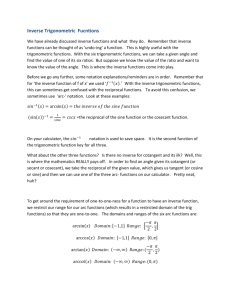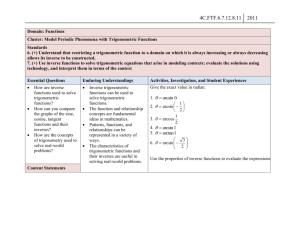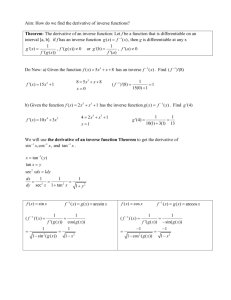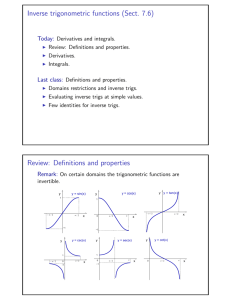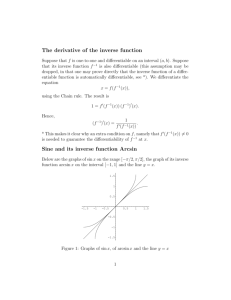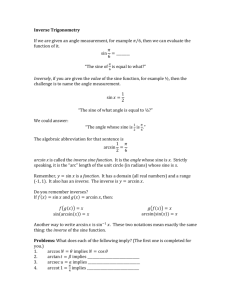Section 4.8
advertisement
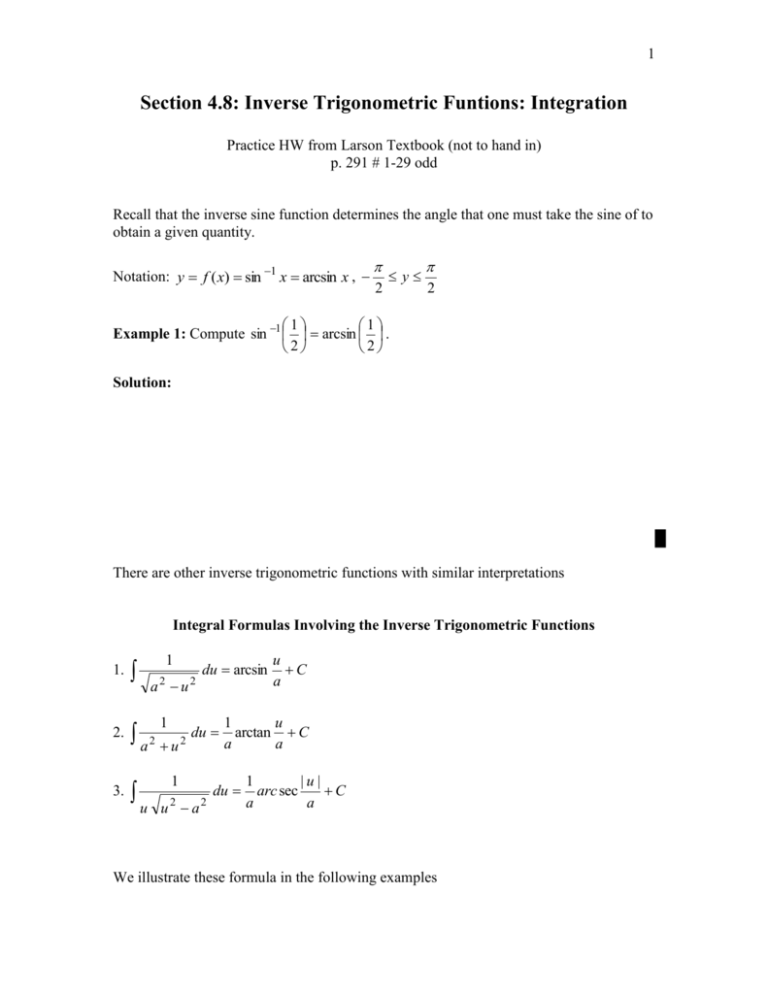
1 Section 4.8: Inverse Trigonometric Funtions: Integration Practice HW from Larson Textbook (not to hand in) p. 291 # 1-29 odd Recall that the inverse sine function determines the angle that one must take the sine of to obtain a given quantity. Notation: y f ( x) sin 1 x arcsin x , 2 y 2 1 1 Example 1: Compute sin 1 arcsin . 2 2 Solution: █ There are other inverse trigonometric functions with similar interpretations Integral Formulas Involving the Inverse Trigonometric Functions 1 u C a 1. 2. a 2 u 2 du a arctan a C 3. a2 u2 du arcsin 1 1 1 u u2 a2 du u 1 |u| arc sec C a a We illustrate these formula in the following examples 2 Example 2: Integrate 1 16 x 2 dx Solution: █ Example 3: Integrate 1 x 9 4 x 2 dx and compare with 9 4 x 2 dx Solution: █ 3 Example 4: Integrate t 16 t 4 dt Solution: This formula that best fits this integral is 1 du arcsin u C a a2 u2 (however, this function has the variable t in the numerator). We can integrate using a udu substitution as follows: t 16 t 4 t dt (4) 2 (t 2 ) 2 dt Let u t 2 1 du 2 (4) 2 (u ) 2 du 2t dt 1 du t dt 2 1 (Bring outside integral) 2 1 1 du 2 (4) 2 (u ) 2 1 u arcsin C 2 4 (Apply integratio n formula with a 4) 1 t2 arcsin C 2 4 (Substitut e and write answer in terms of t ) █ 4 Example 5: Integrate ex 4 e2x dx Solution: This formula that best fits this integral is 1 1 u a 2 u 2 du a arctan a C (however, this function has the e x term in the numerator). We can integrate using a u-du substitution as follows: ex 4 e2x dx ex (2) (e ) 2 x 2 dx (Note e 2 x (e x ) 2 ) Let u e x 1 (2) (u ) 2 2 1 u arctan C 2 2 1 ex arctan C 2 2 du du e x dx (Apply integratio n formula with a 2) (Substitut e and write answer in terms of x) █ 5 Example 6: Integrate x3 2 x 2 1 dx Solution: █ 6 Integrating By Completing the Square Involves completing the square to rewrite function a form where it can be integrated using an integration formula. Steps for Completing the Square 1. Make sure the coefficient of the x 2 term is 1 and the quadratic term is of the form x 2 bx c . 1 2. Take of the coefficient of the x term, square it, and add and subtract the term to the 2 1 polynomial expression. That is, for x 2 bx c , take of the coefficient of the x 2 term, b , square to get 2 2 b , and compute 2 2 2 2 2 b b x 2 bx c 2 2 b b 3. Write as perfect square of the form x c and try to apply an integration 2 2 formula. 7 1 Example 7: Integrate 3 1 x 6 x 13 2 dx Solution: █ 8 Example 8: Integrate 1 x 2x 2 dx Solution: Note that in this problem, the coefficient of x 2 is -1 instead of 1. We perform the following steps to integrate the function. 1 x 2x 2 dx 1 ( x 2 x) 2 (Factor understood 1 ) dx 1 ( x 2 2 x 1) 1 dx Take 1 (2) 1 and square to get (-1) 2 1 2 Note how the 1 is added and subtracted 1 ( x 1) 1 2 1 1 ( x 1) 2 1 1 ( x 1) 2 1 (1) 2 (u ) 2 arcsin u C 1 arcsin( x 1) C dx Write as a perfect square dx Rearrange terms under radical dx Let u x 1, du dx du Let u x 1, du dx (Apply arcsin integratio n formula with a 1) (Substitut e and write answer in terms of x)

